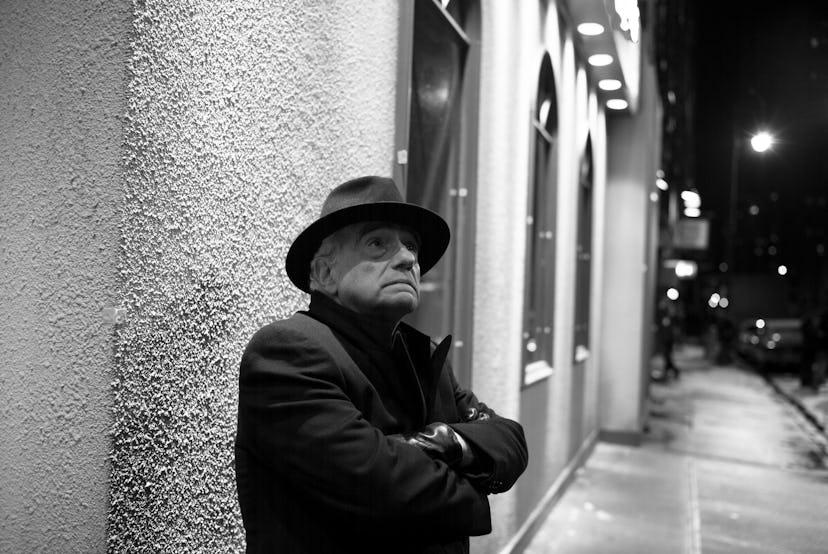Like His Movies, the New Martin Scorsese Docuseries Is a Story of Ruin & Redemption

Martin Scorsese has spent more than half a century considering what it means to fail. Doomed characters feature in each of his most famous films. Whether they’re the lost souls of Taxi Driver and Raging Bull or the slick grifters of Goodfellas and The Wolf of Wall Street, the 82-year-old director’s obsession with boom-bust cycles of self-destruction and redemption has always been a thinly veiled commentary on the shadow side of the American dream. It also, apparently, mirrors the rhythm of Scorsese’s own story.
In Mr. Scorsese, a new Apple TV+ docuseries directed by Rebecca Miller, Scorsese’s prolific life is distilled into five startlingly intimate hours that include thoughtful interviews from those who know him best, including childhood friends, ex-wife Isabella Rossellini, frequent collaborators like Leonardo DiCaprio and Robert DeNiro, all three of his daughters, and Scorsese himself. Part biography, part film school crash course, Mr. Scorsese presents the director as a perennial outsider who fought his way from being a homebound, asthmatic child in his mafia-adjacent Lower East Side neighborhood (the inspiration, of course, for many of his films) to a titan of American cinema.
While his successes are well-documented, Mr. Scorsese doesn’t shy away from his lows, like a near-fatal drug addiction and repeatedly being ostracized from his beloved Hollywood following the release of several flop films (it’s hard to believe now that Raging Bull was nearly one of them). Miller, who first met Scorsese while her husband, Daniel Day-Lewis (who also makes a rare appearance in the series) was filming Gangs of New York, managed to get the typically private Scorsese to open up during a series of interviews on her porch during the pandemic. Below, she shares what she learned from the experience:
What was the most surprising thing about working with Scorsese on this series?
How very honest he is with himself. It’s an unusual quality, and you can feel it in his work. He’s identifying with characters and not trying to make them other than what they are. It’s like the Casino scene with Joe Pesci and the pen—I’m still watching with my eyes slightly closed, but the message I got loud and clear was that in life, you have to open your eyes and be honest.
There was so much material to cover. Scorsese has directed 26 feature films over 56 years, not to mention his various other projects. He’s also been married five times and has three daughters. How did you approach putting all that life into one story?
I had a scaffolding, which was the films. I knew from the beginning I wasn't going to attack all of the television things. I just thought, I can’t do everything. It was important to me to think of it as a series of portraits rather than a filmography or an academic treatise. That way, we were already starting in a place of intimacy and trust.
Also, we thought it was going to be one movie. As we cut that first episode, it was clear that it couldn’t be 20 minutes long. It had to breathe. You had to get to know him. All of the things he’s done are rooted in the neighborhood, in the family, and in those early friendships.
A young Martin Scorsese
Several parts of the series feel like mini film school lectures, with Scorsese and his collaborators talking about their influences and techniques.
That’s what I wanted, that balance. There’s the personal, but it’s also so important how the films were conceived, how they evolved, and how each one is so different.
The other big thread is the way an artist makes sacrifices for their art, which, as depicted in the series, resulted in divorce, time away from children, and drug addiction. At one point, he says artistry involves cruelty.
Yes, he’s talking about Mean Streets when he says that you have to be cruel enough to be an artist. In that case, he was very honest, and certain people weren’t happy about it. You have to choose between being true to your art and being true to what you see, and not sparing people’s feelings. In the end, unfortunately, if you’re really going to do truthful work, you have to honor the work. Sometimes that involves a single-mindedness that can seem cruel. In the film, you see how he evolves as a person and comes to, as screenwriter Jay Cox says, the learning that you could be selfish in your art, but not in your life.
Martin Scorsese and then-wife Isabella Rossellini. They were married from 1979 to 1982.
What do you think Scorsese’s lasting legacy will be?
He is truly a film evangelist. Through The Film Foundation, he’s protecting and rescuing films all the time, all over the world. He cares so much about the art form. That’s a part of his legacy. It’s immense—his influence on the style of American cinema in particular, but also globally.
Leonardo DiCaprio and Martin Scorsese
What’s your favorite Scorsese film?
Raging Bull is a stone-cold masterpiece. It’s like one of Michelangelo’s slave sculptures. It has a monumental, titanic perfection about it that I can’t help but feel should be in the running for his greatest film. But I also absolutely love The Wolf of Wall Street, and Alice Doesn't Live Here Anymore, plus Taxi Driver’s obviously a great film. I love The Irishman.
Studying them as I have, my appreciation of the craft, care, and obsession in all his films has deepened. I also became completely obsessed with the craft of this documentary. Once you spend long enough time with this person, it’s infectious.